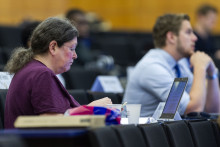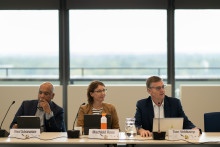In the discussion at the general meeting this morning, the University Council and the Executive Board seemed to be on the same page. Hanneke Becht (Campus Coalition) mentioned that proctoring is a last resort, according to the University Council. ‘We’re not happy with proctoring as it is. Tests were withdrawn at the Erasmus University in Rotterdam, fraud is apparently still possible. But we agree that if the crisis takes a turn for the worse, we need at least something – if we really need to.’
Caution
Rector Thom Palstra agreed. ‘These are strange times. Indeed, we’re also not happy with introducing large-scale proctoring and we don’t intend to do this. Proctoring should be used if all other options are not workable.’
The rector continued by stating the UT is exercising caution when it comes to proctoring. ‘We are not unknown to it, ITC is using proctoring for distance education already. The TELT department is in the process of testing the software. And we’re learning from other universities. We can see a clear pattern in their behaviour: first enthusiasm, then backtracking and scaling back by using proctoring in a wiser setting.’
What if the software fails?
But what will the UT do when the software fails, like in Rotterdam? ‘It’s software, so there are always possibilities of failure. But retracting a diploma is a beyond last resort measure, we should avoid this at all cost,’ Palstra reassured the council. ‘I discussed this matter with the examination boards. To put it bluntly, if the shit hits the fan, they have the responsibility to guarantee results and they are very much aware of that responsibility.’
Moving forward with proctoring, changes to the Education and Examination Regulations will have to be made. And the UT knows that a so-called Data Protection Impact Assessment is essential to have in place. Meaning that, should proctoring be an ultimate solution, it will be used no earlier than the second quartile.







